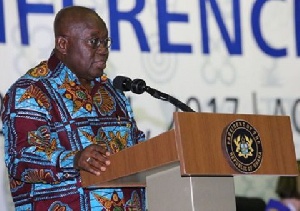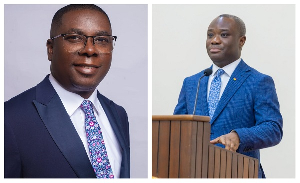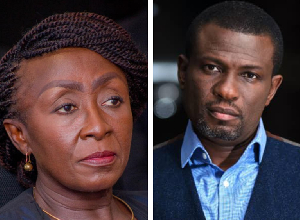President Nana Addo Dankwa Akufo-Addo was present at the 4th Rotary International District 9102 Conference where he commended the Rotary Foundation for their humanitarian contributions to the society.
The event which attracts Rotarians from four countries that make up the Rotary International District 9102 - Benin, Ghana, Niger and Togo - is being held in Accra.
Read full speech of the President below:
ADDRESS BY THE PRESIDENT OF THE REPUBLIC, NANA ADDO DANKWA AKUFO-ADDO, AT THE OPENING SESSION OF THE 4TH ROTARY INTERNATIONAL DISTRICT 9102 CONFERENCE IN ACCRA, GHANA, ON FRIDAY, APRIL 21, 2017.
It is with considerable pleasure that I am participating in the 4th Rotary International District 9102 Conference, which is being held in our capital city of Accra.
Those of you who come from beyond our shores are welcome amongst a people who pride themselves on their sense of hospitality. Akwaaba is our word of welcome, and I hope you enjoy your stay with us.
Je souhaite la bienvenue à nos frères et soeurs francophones parmi vous. J’aurais voulu bien faire cet discours en francais, mais mes compatriots auraient du mal à encaisser comment ca c’est fait que leur president parle en public dans le pays dans une langue qu’ils ne comprennent pas. Mais, quand même, vous etes le bienvenue.
Even though I am not a Rotarian, I think it is worth telling this assembly of Rotarians that I am a proud Paul Harris Fellow of The Rotary Foundation, and what is more, I seem to have always been surrounded on all sides by Rotarians.
I am here this afternoon to underscore the point that, even though I may not share in the weekly fellowship that you have in your clubs, I share common cause with you as far as the Object of Rotary and the pursuance of the ideals of your 4-Way Test are concerned.
Proof of my being surrounded by Rotarians can be seen from the sheer number of my Ministers and government appointees who are past or current Rotarians.
Let me cite a few examples: the Minister for Trade and Industry, Alan Kyerematen; the Minister for Finance, Ken Ofori-Atta; the Attorney General and Minister for Justice, Gloria Akuffo; and the Minister for Communications, Ursula Owusu Ekuful, at whose instigation I became a Paul Harris Fellow. And then of course, there is Mr Rotary himself, the venerable Sam Okudzeto, for a long time a prized counsellor of mine, who is now a member of the state advisory body, the Council of State of the Republic.
Rotarians are and have always been well placed to influence events and policies in our country. I doubt that there has ever been any government in this country where there have not been Rotarians at the centre of affairs or at strategic points. Rotary may be apolitical, but Rotarians have never avoided politics in real life.
Rotary played an honourable role in the founding of the United Nations and of many of the humanitarian agencies in the period following the end of the Second World War in the last century.
It set itself apart very much as the nonpartisan and humanitarian entity that seeks to do good.
It is in the adoption and implementation of specific initiatives that Rotary has made an enviable name for itself. I cannot think of a better example than the tenacity of purpose shown by Rotary and Rotarians in the fight against the scourge of polio.
Thanks to Rotary, this dreaded disease has been reduced from an annual worldwide infection rate of 350,000 cases in over 125 countries, to a mere 75 cases in only 3 countries. Mercifully, we can now say that total elimination of polio is in sight. It is particularly heart-warming to learn that, as I speak, none of the four countries in your District, that is Ghana, Togo, Benin and Niger, has recorded a single case of polio over the past nine years.
This would be one of the great stories of world history, if, indeed, we achieve total elimination of polio. Mankind would owe Rotary a debt of eternal gratitude.
And yet in spite of all the hard work and dedication and money that have been spent over the years, we know that all it needs is for one country in a region to slide into instability, and polio would be back.
The difficulties that came with reaching where we are in the fight against polio reinforce the point I seek to make. We need to get the politics of our countries right to be able to get the other sectors of our lives to work efficiently.
I am, thus, encouraged that our own Rotarians have never shied away from politics, even if the organization itself remains resolutely nonpartisan. The lesson that emerges from your experience surely must be the critical need for organizations such as Rotary to work with and collaborate with government, so both sides can learn from each other.
Taking a look at what you call the Six Areas of Focus of Rotary, it is evident that your programmes are not different from what a government with an agenda of social and economic transformation would undertake in our circumstances.
The first responsibility of any government to its people is to ensure peace and stability. Your first chosen area of focus is Peace and Conflict Prevention and Resolution. You might not think you are in government or even being political, but your stated aims and activities do not differ from what we in government should do.
It is noteworthy that the four countries in your District all currently enjoy relative internal peace. Let us always keep in mind that peace is something we have to strive for at all times, and I am glad to have you as an ally to work to keep the peace and prevent conflict.
In another area of focus, which is Disease Prevention and Treatment, the role of Rotary in the Global Polio Eradication Initiative (GPEI) is a clear testimony of what collaboration between the state and non-governmental organisations can achieve.
You have taken on the other great killer of our part of the world, malaria, and I wish to congratulate Rotary on your Roll Back Malaria project. It does look as though we are finally making headway in the fight against malaria. This is also the result of collaboration between government and non-governmental organizations.
I am glad that my wife, Rebecca, Ghana’s beautiful, new First Lady, who is here with me, has for the last 10 years headed an organisation, Infanta Malaria, which has also been engaged in the fight against malaria, especially where children are involved, as its name indicates.
You are making waves in other areas of the health sector. The Rotary Family Health Days, which, I hear, you commissioned three years ago to offer free medical screening to the less endowed in our communities, has already benefited 120,000 persons. Many, many congratulations.
It is certain that one of the most significant interventions Rotary makes in our communities in is in your Water and Sanitation area of focus.
Your boreholes and small water systems have brought relief to many communities around the country. My Rotarian friend, Nora Bannerman, was very prominent, when she was President of the Accra-North Rotary Club, in that particular outreach. I am pleased to learn that you have started the second phase of a US$6 million Rotary International/USAID Water Collaboration.
We could not ask for a better partner than Rotary as we seek to implement our government’s programme to provide potable water and good sanitation to all our people.
Mr Chairman, Rotary is in a good position to help in the education of people on the importance of taking good care of our water sources and rivers. You can help instil the habit of routine and regular maintenance of the mechanized boreholes and small town water systems in the small communities in which you work.
You can help bring home the message that the communities have a responsibility to take care of the water systems that are provided for them. Another area of collaboration is in Maternal and Child Health and it is good news that Rotary is active in this sector as well.
The future health of our countries depends to a large extent on how we start our children off in life. Education is the only way to give a good head start and provide equal opportunities for all our children. Your Basic Education and Literacy area of focus is very critical to government plans.
This government believes that a lot hangs on the success of our education programmes, and we welcome enthusiastically all the help that we can get from organizations such as Rotary in delivering quality education to our people.
Rotarian friends, all our best laid plans will come to naught unless our economy grows and thrives.
I note your Economic and Community Development area of focus and I am sure that you approach this also with your customary zeal. I know it helps many people in the rural areas in particular, and there are projects in the inner cities that are dependent on such initiatives. I thank you for your efforts. You should be aware that, for the first time in the nation’s history, we now have a Minister for Inner City and Zongo Development, who ought to be a natural partner for you.
Mr Chairman, I hope what I am about to say is not taken as looking a gift horse in the mouth. After 60 years of independence, I want us, in Ghana, to break out from our aid dependent and charity driven economic outlook. I want programmes that would be dynamic in content and help us to think big and be dissatisfied with remaining poor.
Programmes that help the poor and vulnerable are important and admirable, but I do not want us to continue to be unduly reliant on long term aid projects. I want all such projects to have clear-cut exit strategies. It is not enough to get help to be able to feed your family. The help must be so structured as to enable you strike out and be able to lead an independent life.
I remember when the LEAP programme was envisaged and introduced under President Kufuor, we were clear in our minds that, whereas we wanted it to cover all those who would qualify under the definition of the programme, it was meant to be a hand-up, not a hand-out. If someone has to go on the LEAP programme, it should not be for the rest of that person’s life.
There should be a definite time limit to being a LEAP beneficiary, and the beneficiary should be able to stand on his or her own after the stated period. Whatever economic programmes you bring, please let it be something that helps people to stand on their own feet and prosper.
A few days ago I launched the Planting for Food and Jobs programme in Goaso, in the Brong Ahafo Region. I am excited about it and I am confident that it will provide a lot of opportunities to help lift people out of poverty and onto an independent economic life. It might well be that Rotary would be able to join us in making a success of this project. You have experience in community work and I would say this is something right up your street.
Mr Chairman, I urge you to take a good look at our One District One Factory programme. It is a programme in which private sector participation is essential. Come and join us make a success of it. You have a lot of people with good business acumen and experience amongst your ranks.
There are a lot of opportunities and I invite you to join us bring prosperity to our people.
Mr Chairman, I understand Rotary has a Punctuality and Time Management initiative as well. You certainly know how to touch all the necessary buttons with the things I hold dear. I wish you good luck with this particular initiative, as I try to keep up my own end of the campaign for punctuality and time management.
We are determined to build a new Ghanaian and African civilisation, where the rule of law works, where individual liberties and human rights are respected, and where the principles of democratic accountability are the foundation of public policy.
We are determined to forge a new Ghanaian and African, who is neither a victim nor a pawn of the world economic order, but who will be a dignified member of a successful, thriving, prosperous society.
I shall strive to remain a Paul Harris fellow of whom Rotarians can be proud, and I wish you all the best of luck and good deliberations and a successful Conference.
Thank you and may God bless us all and our homeland Ghana, and make her great and strong.
General News of Saturday, 22 April 2017
Source: peacefmonline.com

















